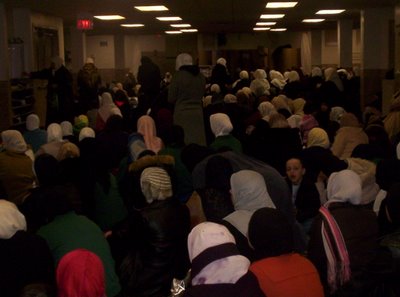Senate Vote Saves Immigration Bill Chances
Immigrants and non-immigrants alike have taken to the streets and protested for comprehensive immigration reform, creating a very strong grassroots movment, which is being compared to the civil rights movement of the 1960. After negotiations for immigration reform fell through before Congress adjourned for recess, the Senate has vowed to pass some sort of legislation during this year. Currently proposed on the floor includes some provisions that would provide a path to legalization for millions of undocumented individuals. However, it imposes of the harshed provisions heavily borrowed from the original House bill sponsored by Representative James Sensenbrenner (R-WI).
 The Associated Press
The Associated PressTuesday, May 23, 2006; 11:49 AM
WASHINGTON -- The Senate rejected a California Democrat's plan to allow the estimated 12 million illegal immigrants in the country to remain, work and eventually become Americans, preserving a fragile bipartisan coalition needed to pass the bill.
Several lawmakers who voted against the proposal offered by Sen. Dianne Feinstein on Tuesday said they did so reluctantly, but out of necessity to ensure survival of the broader immigration bill. The legislation is expected to win Senate passage Wednesday or Thursday.
"This legislation is on the edge of the ledge as it is," said Sen. Arlen Specter of Pennsylvania, one of the Republicans supporting a delicate compromise that has kept the bill alive _ letting two-thirds of illegal immigrants stay but making the other third leave.
Feinstein's amendment, defeated 61 to 37, would have supplanted the compromise that allows illegal immigrants here five years or more to stay and work six years and seek legal residency after paying back taxes and fines and showing they were learning English.
Those in the country two to five years under the compromise would have to go to a point of entry, exit and file an application to return as a guest worker. Those here less than two years must leave the country, but could apply from their native country to return as a guest worker and wait in line to get a visa.
"I have come to believe that the three-tiered system is unworkable, that it would create a bureaucratic nightmare and it would lead to substantial fraud," Feinstein said Tuesday.Sen. Tom Harkin, D-Iowa, said the compromise bill could mean losing Latinos in his state who have helped revive some of its small towns by buying homes and starting small businesses. Feinstein offered the plan just before Senate Majority Leader Bill Frist set the stage for a preliminary vote Wednesday that could quickly bring the bill to a final vote. The bill appears headed for passage.
A bigger fight on the bill is still to come _ when the House and Senate meet to negotiate a compromise bill. The House passed an enforcement-only bill that makes illegal immigrants felons, cracks down on hiring of illegal immigrants and steps up border security. It offers no path to citizenship or a guest worker program, which critics say is amnesty.
"If we are lucky, the House of Representatives will say it's got to be better," Sen. Jeff Sessions, R-Ala., said of the Senate bill after predicting Monday it would pass.
Feinstein's proposal faced an uphill climb. Republican Sen. John Cornyn of Texas said it suffered the same "infirmities" as the bipartisan bill approved by the Senate Judiciary Committee, which offered citizenship for all illegal immigrants.
Feinstein's proposal required all illegal immigrants to register with the Department of Homeland Security, get fingerprinted and go through criminal and national security background checks. They would get an "orange card" encrypted with identifying information and signifying they are legal workers after passing the background checks, demonstrating an understanding of English, U.S. history and government and paying back taxes and a $2,000 fine to apply. They would go to the back of the line and could apply for legal permanent residency when a number they are given is reached.
Also Monday, the Senate showed support for President Bush's plan to deploy National Guard troops to the border by endorsing an amendment authorizing governors to order their state's Guard units to perform duties in border states.



